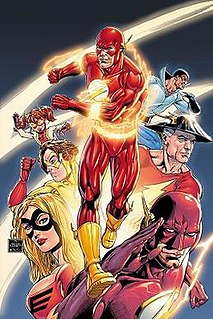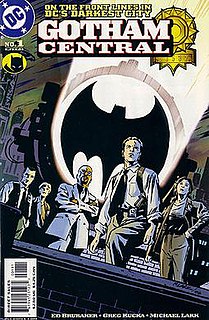This article does not cite any sources .(July 2007) (Learn how and when to remove this template message) |
| Idiotland | |
|---|---|
| Publication information | |
| Publisher | Fantagraphics |
| Schedule | quarterly |
| Format | standard |
| Publication date | Mar. 1993 – Dec. 1994 |
| No. of issues | 7 |
| Main character(s) | Margarita Schnapps, Lavender Sachet, Milkshake Gravy, Morties |
| Creative team | |
| Written by | Doug Allen and Gary Leib |
| Artist(s) | Doug Allen and Gary Leib |
Idiotland is a surrealistic comic book by Doug Allen and Gary Leib published by Fantagraphics in 1993–1994. It is noticeably more surreal and Dada-esque that Allen's more-famous work, the Steven comic strip and its compilations.
Doug Allen is an American underground cartoonist, illustrator, and musician. Best known for his long-running comic strip Steven, Allen has over the years collaborated with long-time friend Gary Leib on music, animation, fine art, and comics, including the two-man Fantagraphics anthology Idiotland.
Gary Leib is an American underground cartoonist, animator, and musician. Best known for the comic book Idiotland, Leib's work has also appeared in The New Yorker, The New York Times, Musician Magazine, The New York Observer, RAW, BLAB! and as weekly features in New York Press for many years. Leib also designed a popular line of promotional toys for The Hershey Company.

Surrealism is a cultural movement that began in the early 1920s, and is best known for its visual artworks and writings. Artists painted unnerving, illogical scenes with photographic precision, created strange creatures from everyday objects, and developed painting techniques that allowed the unconscious to express itself. Its aim was to "resolve the previously contradictory conditions of dream and reality into an absolute reality, a super-reality".
Idiotland was low on plot and high on bizarre characters of unusual anatomy and memorable names, such as Margarita Schnapps and Lavender Sachet, a pair of mean-spirited, middle-aged shopaholics in anthropomorphic animal form, or Milkshake Gravy, a nosy, unattractive, cross-dressing mailman. It also includes the serialized, three-part story, "Morties," about a small community overtaken by parasitic, mind-controlling fish, called Morties, which bubble up from the brain and burst through the skull. After "Morties" concluded, a new serial began in issue #4, called "Lunch Money." Both stories starred the creators Allen and Leib portrayed as children.
Compulsive buying disorder (CBD), or oniomania, is characterized by an obsession with shopping and buying behavior that causes adverse consequences. According to Kellett and Bolton, compulsive buying "is experienced as an irresistible–uncontrollable urge, resulting in excessive, expensive and time-consuming retail activity [that is] typically prompted by negative affectivity" and results in "gross social, personal and/or financial difficulties". Most people with CBD meet the criteria for a personality disorder. Compulsive shopping is classified by ICD-10 (F63.8) as an "impulse control disorder, not otherwise classified." Several authors consider compulsive shopping rather as a variety of dependence disorder.
Idiotland was nominated for a 1994 Harvey Award for Best New Series. It ran for seven issues.
Notable events of 1994 in comics. See also List of years in comics.
The Harvey Awards are given for achievement in comic books. Named for writer-artist Harvey Kurtzman, the Harvey Awards were founded by Gary Groth in 1988, president of the publisher Fantagraphics, to be the successor to the Kirby Awards that were discontinued in 1987.












